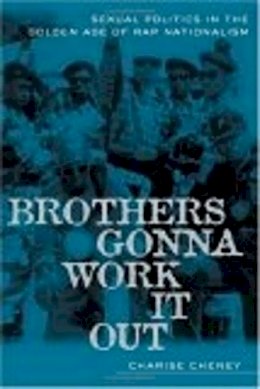
Brothers Gonna Work it Out
Charise Cheney
Brothers Gonna Work It Out considers the political expression of rap artists within the historical tradition of black nationalism. Interweaving songs and personal interviews with hip-hop artists and activists including Chuck D of Public Enemy, KRS-One, Rosa Clemente, manager of dead prez, and Wise Intelligent of Poor Righteous Teachers, Cheney links late twentieth-century hip-hop nationalists with their nineteenth-century spiritual forebears.
Cheney examines Black nationalism as an ideology historically inspired by a crisis of masculinity. Challenging simplistic notions of hip-hop culture as simply sexist or misogynistic, she pays particular attention to Black nationalists’ historicizing of slavery and their visualization of male empowerment through violent resistance. She charts the recent rejection of Christianity in the lyrics of rap nationalist music due to the perception that it is too conciliatory, and the increasing popularity of Black Muslim rap artists.
Cheney situates rap nationalism in the 1980s and 90s within a long tradition of Black nationalist political thought which extends beyond its more obvious influences in the mid-to-late twentieth century like the Nation of Islam or the Black Power Movement, and demonstrates its power as a voice for disenfranchised and disillusioned youth all over the world.
Product Details
About Charise Cheney
Reviews for Brothers Gonna Work it Out
Jane Rhodes,author of Framing the Black Panthers: The Spectacular Rise of a Black Power Icon "A lively, unique, and often revisionist perspective on the sexual politics of hip-hop culture."
William L. Van Deburg, author of New Day in Babylon: The Black Power Movement and American Culture, 1965–1975 "A provocative analysis that no one will be able to ignore. A compelling challenge to consider the ways that patriarchy has influenced the movement for black self-determination."
Choice, Highly Recommended
"A study of rap singers of the 1980s and 90s that sets their political expression in the context of the racial and sexual politics of black nationalism since the early 19th century."
The Chronicle
"In her book, Cheney tries to dispel the notion that all rap music is about sex, violence and bling. . . . The book is insightfulparticularly to white Americans who don't get the appeal of Louis Farrakhan or to older African-Americans whose knowledge of black music stops at Smokey Robinson. After reading this book, both groups might at least be tempted to sample some Public Enemy music."
The San Luis Obispo Tribune
